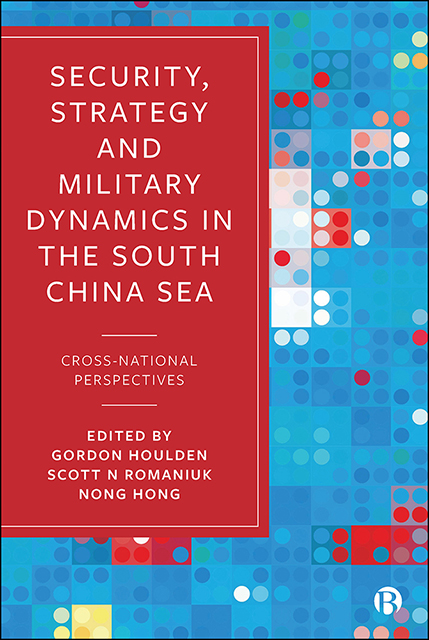Book contents
- Frontmatter
- Contents
- List of Tables
- Notes on Contributors
- Foreword
- Introduction: Strategic Challenges and Escalating Power Rivalry in the South China Sea
- 1 Between Competition and War: Complex Security Overlay and the South China Sea
- 2 The South China Sea as an Echo Chamber of Chinese Foreign and Security Policy
- Part I Claimants of the Contested South China Sea
- Part II Non-Claimants in Southeast Asia
- Part III Quadrilateral Security Dialogue States
- Part IV Non-Claimants in Europe and Eurasia
- Conclusion: Looking over the Horizon – Prospects for Settlement of the South China Sea Dispute?
- Index
17 - Balancing and Hedging: The Two Levels of Russia’s Behaviour in the South China Sea
Published online by Cambridge University Press: 13 April 2023
- Frontmatter
- Contents
- List of Tables
- Notes on Contributors
- Foreword
- Introduction: Strategic Challenges and Escalating Power Rivalry in the South China Sea
- 1 Between Competition and War: Complex Security Overlay and the South China Sea
- 2 The South China Sea as an Echo Chamber of Chinese Foreign and Security Policy
- Part I Claimants of the Contested South China Sea
- Part II Non-Claimants in Southeast Asia
- Part III Quadrilateral Security Dialogue States
- Part IV Non-Claimants in Europe and Eurasia
- Conclusion: Looking over the Horizon – Prospects for Settlement of the South China Sea Dispute?
- Index
Summary
Introduction
Russia's behaviour in the South China Sea (SCS) dispute is a puzzling case for international relations scholars. On the surface, Russia's official approach is to persuade the rival claimants and the broader international community that Russia is an extra-regional player that has no direct stakes in the SCS and, therefore, prefers not to be involved. However, behind the façade of disengagement are large-scale energy and arms deals with the major disputants. Most puzzling are Russia's relations with China and Vietnam – the two major rival parties in the SCS and, simultaneously, Russia's closest and most important Asian partners.
Most of the existing assessments interpret Russia-China-Vietnam relations in zero-sum terms. Thus, the strengthening of the Russia-Vietnam partnership is presented as a means for Russia to contain or balance the alleged Chinese threat. According to this narrative, Russia worries about overdependence upon an increasingly influential China and tries to arm or conclude economic deals with Vietnam and other actual or potential adversaries of China in the SCS and in Asia more broadly. The other side of such an interpretation is based on the evidence of a growing military entente between China and Russia and pictures Russia as siding with China at the cost of relations with other regional partners, including Vietnam, particularly after the Ukraine Crisis. According to this story, as a China-Russia strategic alignment grows, Russia is likely to snub those of its partners who are at odds with China.
These interpretations are incomplete. First, they make the coexistence of the Russia-China and Russia-Vietnam strategic partnerships a sheer paradox. However, both relationships have existed and even progressed for quite some time. Second, although Russia does try to enhance cooperation with Vietnam and other regional states, its cooperation with China continues to grow, and there is no evidence of Russia intentionally trying to slow it down. Third, the Russia-Vietnam partnership should not be underestimated, because it has been growing despite and independently of Russia-China relations. In summary, cooperating with both China and its rival claimants characterizes Russia's policies in the SCS.
This chapter argues that to untangle this situation, one must “zoom out” to see the logic of both international systemic and non-systemic (regional and domestic) levels of great-power behaviour.
- Type
- Chapter
- Information
- Security, Strategy, and Military Dynamics in the South China SeaCross-National Perspectives, pp. 331 - 348Publisher: Bristol University PressPrint publication year: 2021



